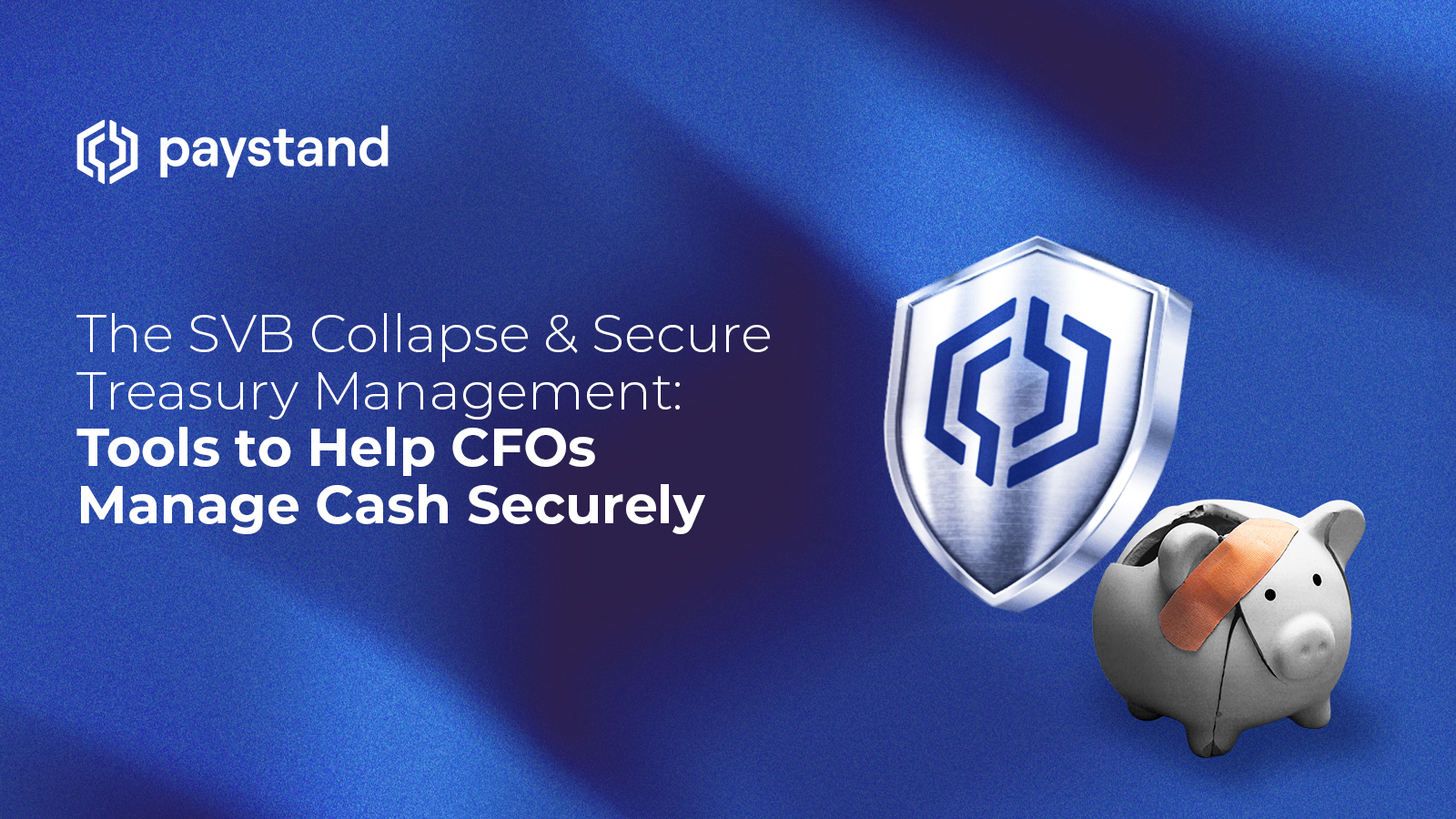The SVB Collapse & Secure Treasury Management: Tools to Manage Cash Securely

Secure treasury management is top of mind now more than ever. In light of the recent collapse of SVB, we at Paystand are redoubling our efforts to provide CFOs with the tools they need to efficiently manage, monitor, and confidently access their cash resources.
What Happened to Silicon Valley Bank?
Silicon Valley Bank (SVB) collapsed, and financial regulators seized its assets on March 10, 2023. SVB’s collapse marks the second-largest US bank failure behind the 2008 failure of Washington Mutual.
How Did SVB Fail?
SVB’s stock collapsed when they experienced a bank run on March 8th and 9th. Several factors triggered the run, including SVB disclosing a $1.8 billion loss and a downgrade from Moody’s risk management agency.
By March 10th, SVB account holders found their cash locked up and out of reach.
How is the SVB Collapse Affecting the Economy?
Depositors will eventually get access to all the money they deposited in SVB. Still, the collapse is causing significant and troubling effects throughout the financial sector in addition to short-term pain for depositors.
SVB's collapse reveals an inherent risk within the US central banking system. Banks represent a single point of failure risk, and customers ultimately lack control over their deposits. If a bank becomes insolvent, its customer deposits become insolvent as well. Not all companies are safeguarded with fund reserves and healthy cash flow to maintain financial operations in an emergency.
At this point, the biggest objective for CFOs - even if there is no SVB link - is to put the company's money in an appropriate portfolio, as opposed to a single institution. Diversification is key to maintaining fast cash flow, payment control, and business growth.
The SVB situation showed that cash flow problems can cascade through a company's operations and impact its ability to pay suppliers, meet payroll, and invest in growth opportunities. Therefore, CFOs must be vigilant in monitoring and managing their company's cash flow to ensure they can withstand potential disruptions in the market.
How do We Avoid Crises Like the SVB Collapse in the Future?
Decentralization. Businesses still need ways to safeguard their cash flow and treasury while maintaining their ability to pay employees and vendors, receive payments, and grow their operations.
Decentralized finance employs open-source technology to diminish banks' and financial institutions' influence on transactions. Without intermediaries slowing down the process, you can receive and reconcile payments in minutes instead of days.
Decentralized payments lower processing fees and give complete control to merchants and buyers. This leads to significantly faster transactions, eliminating the need for days-long settlements.
This technology has many benefits, including increased security, faster settlements, clear records, and scalability. It provides an extra security layer as data is spread across different servers through the blockchain network, making it hard to hack.
Transactions settle in hours or minutes—which frees up cash flow bottlenecks—and are automatically logged and preserved in a "block," which makes managing a clear audit trail easier.
An essential advantage of decentralization is its scalability. Payment platforms can expand and grow alongside businesses without penalties, with transactions executed without third-party involvement. Now growth happens without worrying about constraints in the financial processes.
By decentralizing, businesses can distribute their risk so that no one disaster can wipe out their cash reserves and their ability to do business.
“The SVB situation exposes a risk in banking that few paid attention to. Usually, the discussion among CFOs is how to increase revenue, cut costs, and drive profit margins, not, ‘will the funds in our business checking account be available for us to use tomorrow?’ Paystand, with its decentralized payment network operating on the Blockchain, gives CFOs multiple approaches to collecting, accessing, and managing their funds no matter what."
-Jeremy Almond, Paystand CEO and Founder
Paystand’s Decentralized Finance Solutions
The recent events in the financial sphere have brought attention to a situation we may not have considered. This moment allows us to think ahead, plan, prevent, and take the necessary actions to avoid a financial crisis.
Paystand provides decentralized finance solutions that aim to streamline and digitize commercial transactions for businesses. Our solutions leverage blockchain technology, ensuring secure and transparent processes automatically logged and preserved in a block.
Smart Treasury Management For Accounts Receivable
Treasury management involves managing an organization's financial resources to achieve its strategic and operational objectives. This includes cash, funding, investment, trade finance, risk, and working capital management.
Through their Paystand account, companies can automatically route money to their chosen accounts. They can also define the maximum deposit amount and state that when reached, the rest of the funds go to an alternative account. This process repeats as necessary and complies with the FDIC insurance, which protects $250,000 per depositor, per insured bank, for each account ownership category.
Paystand Spend Instant Bill Payment
Paystand Spend empowers merchants to utilize the funds received through the network for vendor payments and operating expense management. As receivables arrive, merchants can direct funds to prepaid cards and spend them freely, earning 1% back in Bitcoin on every purchase.
With Paystand Spend, money doesn’t go through your bank account. You’ll have quick access to your cash without it getting trapped in your receivables.
The collapse of SVB has highlighted companies' need for secure cash management. It is essential to safeguard their cash flow and avoid potential market disruptions. Paystand's decentralized solutions offer an alternative to traditional banking, reducing risk and increasing security, scalability, and transparency.
In these uncertain times, a secure and reliable financial system is critical. Companies can better manage their resources by adopting decentralized solutions, thus preventing crises and avoiding bankruptcy from disrupting their operations.
Reliable, secure access to cash has never been more important than it is now. Let us guide you on the path of new financial technologies in view of a decentralized revolution.
Click here to talk to us about how strategic treasury management can help keep your business running in good times and bad.




